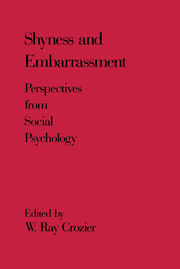Book contents
- Frontmatter
- Contents
- Acknowledgements
- Contributors
- Introduction
- Part I Theoretical issues in the study of shyness and embarrassment
- 1 Social psychological perspectives on shyness, embarrassment, and shame
- 2 Shyness and embarrassment in psychological theory and ordinary language
- 3 The expression of shyness and embarrassment
- 4 The impact of focus of attention and affect on social behaviour
- 5 The evolution and manifestation of social anxiety
- Part II An emphasis upon embarrassment
- Part III An emphasis upon shyness
- Name index
- Subject index
1 - Social psychological perspectives on shyness, embarrassment, and shame
Published online by Cambridge University Press: 21 January 2010
- Frontmatter
- Contents
- Acknowledgements
- Contributors
- Introduction
- Part I Theoretical issues in the study of shyness and embarrassment
- 1 Social psychological perspectives on shyness, embarrassment, and shame
- 2 Shyness and embarrassment in psychological theory and ordinary language
- 3 The expression of shyness and embarrassment
- 4 The impact of focus of attention and affect on social behaviour
- 5 The evolution and manifestation of social anxiety
- Part II An emphasis upon embarrassment
- Part III An emphasis upon shyness
- Name index
- Subject index
Summary
Shyness and embarrassment are frequently encountered in everyday life, and expressions such as “he's come over all shy” or “I was so embarrassed I didn't know where to look” can readily conjure up for us the image of a person in some difficulty in a social encounter. In everyday talk we do not always make a sharp distinction between the two words, and sometimes they refer to much the same thing, so that to call someone shy is to say that he or she is easily embarrassed. Despite their ubiquity, it is only recently that these phenomena have received any detailed consideration by psychologists. Shyness and embarrassment have been studied in isolation from each other and often have been regarded as separate phenomena. In particular, shyness has tended to be viewed as characterising a person, whereas embarrassment has been seen as a property of social interactions. Whenever the focus in research into embarrassment has been on the individual, it has been on the person's role, with the implication that embarrassment is a temporary phenomenon that can be experienced by anyone. On the other hand, the trend has been to regard shyness as a personal dispositional attribute, a potential that the individual brings to the interaction.
Consideration of the earlier literature on shyness and embarrassment reinforces this impression of separate topics. References to shyness are found in the personality and clinical literature (i.e., those fields of psychology that study the individual), whereas references to embarrassment appear in the sociological literature.
- Type
- Chapter
- Information
- Shyness and EmbarrassmentPerspectives from Social Psychology, pp. 19 - 58Publisher: Cambridge University PressPrint publication year: 1990
- 4
- Cited by



